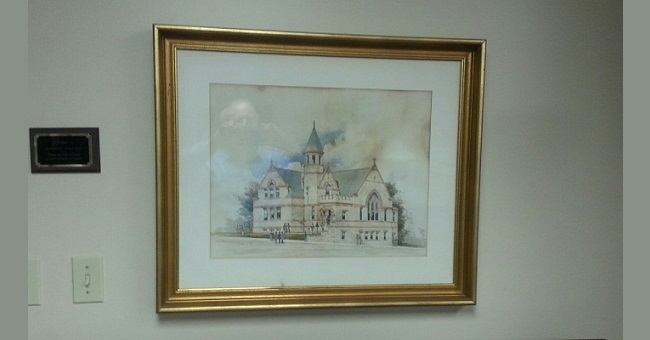by Mike Roberts
During the mid-20th century, Alfred Segal wrote a column for the Cincinnati Post newspaper under the pseudonym of Cincinnatus. This column covered what was happening in the religious world of the city. A frequent contributor to the column was Reverend Albert Q. Perry of our own Universalist Church.
From the February 16, 1961 Post, Cincinnatus discusses “A Wedding and a Blessing”. He states that “The Rev. Albert Q. Perry of City Temple Universalist Church on Essex Place, Walnut Hills, sent Cincinnatus a report on a blessing he gave at a wedding party recently. It came from the minister’s weekly newsletter. It was none of those high social wedding receptions. It was taking place in a White Castle sandwich place…Perry explains, “There were the bride and groom and a carload of friends eating heartily of hamburgers and toasting the future with Cokes”, Mr. Perry tells Cincinnatus. “Silently I offered them my blessing: Bless, O Lord, these two whose life together is begun in circumstances of simplicity. If they may not afford champagne, grant unto them the greater intoxication of unselfish love. Make them to possess the richness of life, if not a life of riches. Grant them the security of moral faithfulness and seal their vows with the jewel of contentment…let them find enduring satisfaction in the worthiness of their children.”
Cincinnatus concludes by passing on the blessing to “all the many weddings which aren’t reported in the social columns of the local press.” He also recollects his own wedding not being reported in the newspaper long, long ago but that it turned out OK through all the long, long years since.
From the March 20, 1961 Cincinnati Post, Cincinnatus wrote about “Of Dying Without Publicity”. He states that “It’s the Rev. Albert Q. Perry of City Temple Universalist Church on Essex Place, Walnut Hills who is reminding Cincinnatus of all those people who don’t get their names in the papers when they die. (Though Cincinnatus himself won’t mind at all getting out of the world without the least notice in the press. He’ll be too dead to feel proud of any publicity.) The Reverend Perry in his weekly newsletter is comforting all those who may not be noticed in the newspaper when they die. He says ‘Blessed are those who live in obscurity, and whose deaths occur without public notice. For they are people who produce our food, who produce the goods which give us jobs, who see the beauty in sunsets, whose prayers are known only by God. Blessed are those who live in obscurity, for these are we, and we must bless one another in love.’ Cincinnatus hands the Rev. Perry’s philosophy on to all who may be worried about what the paper may be reporting about them after they are gone. Cincinnatus agrees with Rev. Perry that it doesn’t matter.”
In the March 30, 1961 issue of the Post, Cincinnatus refers to a letter received from Perry. He says that (Perry) is speaking to Cincinnatus about something he has planted in his heart toward Easter and another springtime. Oh, flowers already are up out of the earth…Cincinnatus himself only yesterday delighted in the sight of a tulip popping up.
The Rev. Perry looks forward hopefully toward seeds he has planted in his own garden, but he tells Cincinnatus about other seeds planted in his heart. “I have planted a hope in my heart… It’s a seed toward peace and good will growing up in the world… I may die tomorrow, surely I shall not survive 100 years but my hope is braver than my body.”
And he advises Cincinnatus and all the members of his congregation: “Come! Plant a hope in your heart! Share in the triumphant process of this springtime season and Easter festival”
Cincinnatus responds, “Well, Cincinnatus, who isn’t of the Reverend Perry’s church, goes along with him on the road of what religion is all about.”
On July 1, 1961, Cincinnatus reported that Reverend Perry and Clarke D. Wells would share the pulpit at the Universalist Church for three consecutive Sundays. They would conduct a series of pulpit conversations on the heritage of Universalism and Unitarianism. The two faiths had recently merged and the conversations were designed to acquaint the congregation with its enlarged heritage.
Two days before this post, Cincinnatus reported that Perry would be leaving the Walnut Hills Church. A friend who was a member of the church, Albert C. Jordan, a labor union official and former councilman reported to Cincinnatus that Perry would be leaving the church in September to take a pastorate in Providence, Rhode Island. The writer reminisced that Perry always spoke not of getting to heaven but rather of keeping the earth worthwhile for us to live in down here. He could only hope that Perry’s replacement would continue with his wisdom.
Image: City Temple Universalist Church on Essex Place, Walnut Hills, sketched 1963

